Choosing your first flute is an exciting adventure! Start with a concert flute; its clear sound suits beginners well. Look for a closed-hole model, which makes finger positioning easier. Test various materials—metal flutes are durable, while plastic ones are lightweight and affordable. Set a budget; good student flutes range from $100 to $300. Consider buying new for warranty protection or used for lower costs. Don't forget maintenance! Regular cleaning and care are essential for longevity. If you're enthusiastic for more tips on features, materials, and purchasing options, there's plenty more to explore!
Key Takeaways
- Choose a concert flute for its versatility and bright sound, ideal for beginners and orchestral settings.
- Opt for a closed-hole flute for an easier learning curve and improved accessibility.
- Consider material options: metal flutes offer durability and clarity, while plastic ones are lightweight and affordable for beginners.
- Set a budget: student models range from $100-$300, while higher quality flutes can cost more.
- Seek guidance from music teachers or online communities for tailored advice and maintenance tips.
Understanding Flute Types
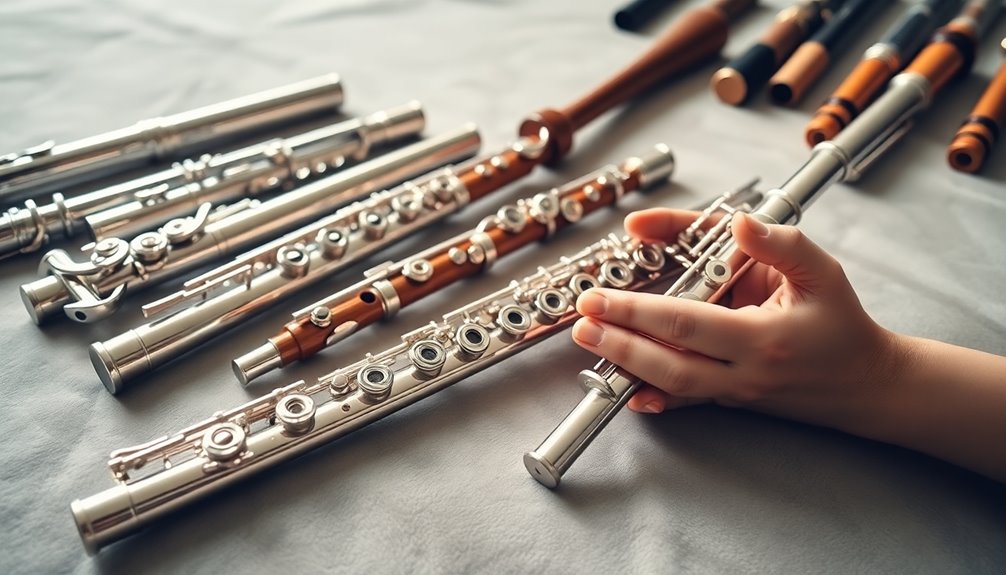
When you're choosing your first flute, it's important to understand the different types available. Flutes come in various forms, each offering unique characteristics that affect how they sound and how you'll play. The most common types include the concert flute, the Piccolo, and the Alto flute.
The concert flute, often made of metal, is the standard choice for beginners. It produces a clear, bright sound that's perfect for orchestras and solo performances. If you're looking for something more compact, the Piccolo is a smaller version that offers a higher pitch and a playful tone. It's great for adding sparkle to ensembles.
On the other hand, the Alto flute is larger and has a deeper, warmer sound, catering to those who enjoy a more mellow tone. Understanding these different flute types helps you find the one that resonates with your musical style. Each type creates distinct flute sound variations, influencing how you express yourself musically.
Additionally, the Western Concert Flute is pivotal in orchestral settings, making it a versatile instrument for beginners.
If you're drawn to sharp, bright notes, the concert flute might be your best bet. Alternatively, if you prefer softer, richer tones, consider the Alto flute. Exploring these options allows you to connect with a community of musicians who share similar interests.
As you commence on this journey, remember that the right flute can enhance your experience, helping you feel a sense of belonging in the vibrant world of music. Choose wisely, and let your passion guide you!
Key Features to Consider
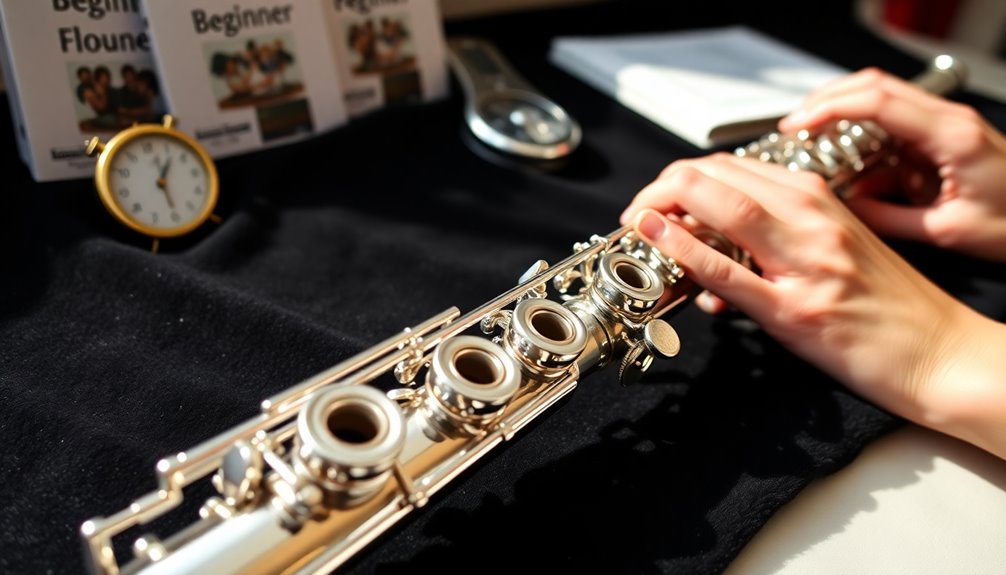
Choosing your first flute involves considering several key features that can greatly impact your playing experience. As a beginner, you'll want to focus on elements that enhance ease of use and comfort. One of the most important key features is the flute's mechanism. Look for a model with a simple key layout that allows your fingers to move freely and comfortably. Closed-hole flutes are often recommended for beginners, as they offer an easier learning curve compared to open-hole flutes.
Another essential aspect is the flute's weight and balance. A lighter flute can make extended practice sessions more enjoyable, reducing fatigue. Pay attention to the flute's ergonomics; make certain it feels good in your hands and that you can reach all the keys without straining.
Next, consider your beginner preferences regarding the sound. Some flutes have a brighter tone, while others produce a warmer sound. If possible, try out different options to see which resonates with you. It's also worth noting that your choice of headjoint can influence the flute's sound quality and playability, so don't overlook this feature. Additionally, choosing a flute made from durable materials ensures that it will withstand regular use and maintain performance.
Lastly, budget is a significant consideration. While you may want the best flute available, there are excellent beginner models that won't break the bank. Balancing quality with affordability will guarantee you feel satisfied with your choice and inspired to continue your musical journey.
Material Choices Explained
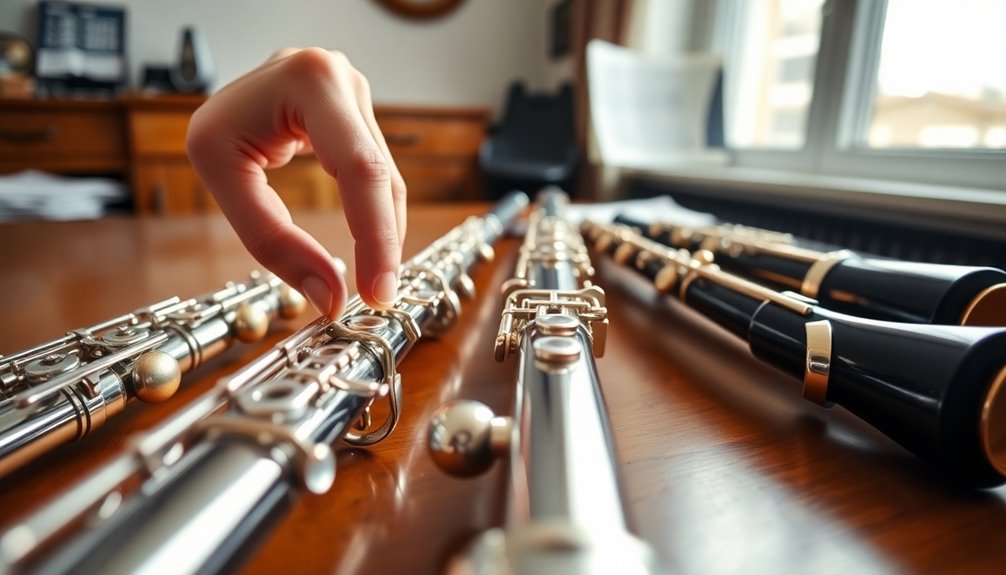
Understanding the materials used in flutes can greatly influence your decision as a beginner. When you're choosing your first flute, you'll encounter various options like wood, metal, and plastic. Each material has its own characteristics, and knowing these can help you find the right fit for your musical journey.
Here are some key points to reflect on:
- Wood Flutes: Known for their warm, rich sound, wood flutes are often favored by traditional players. They can be more challenging to maintain and may require regular tuning.
- Metal Flutes: These are popular among beginners due to their durability and bright, clear tone. Metal flutes typically come in silver, nickel, or a mix, offering a range of sound and price options.
- Plastic Flutes: A great choice for absolute beginners, plastic flutes are lightweight and affordable. They're perfect for kids or those unsure about committing to a more expensive instrument.
- Hybrid Options: Some flutes combine materials, offering unique sound qualities. For instance, a metal body with wooden headjoint can give you the best of both worlds.
As you weigh the options of wood vs. metal and reflect on plastic flutes, remember that the right material will resonate not just with your ears but also with your heart. Additionally, consider how the premium-grade nickel-plated bodies enhance sound resonance, which can significantly affect your playing experience.
Think about where you see yourself playing and what kind of sound you desire. Choosing the right material will set the stage for your musical adventure!
Budgeting for Your First Flute
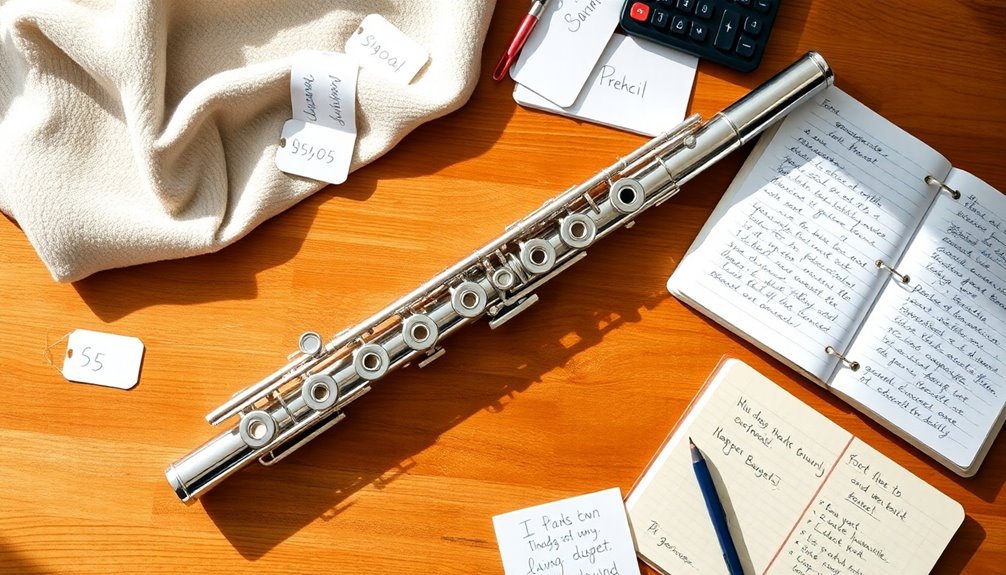
While it might be tempting to splurge on a high-end flute, setting a realistic budget is crucial for your first purchase. A well-planned budget helps you navigate flute pricing and guarantees you find an instrument that suits your needs without breaking the bank.
Begin by determining how much you're willing to spend. Flutes come in various price ranges, and understanding where you stand can help narrow your options. Many music stores offer beginner discounts, making it easier to access quality instruments at a lower cost.
Here's a simple breakdown of potential flute pricing:
| Price Range | Features |
|---|---|
| $100 – $300 | Basic student models, good for beginners |
| $300 – $800 | Intermediate models, better sound quality |
| $800 and above | Professional flutes with advanced features |
When budgeting, don't forget to account for additional costs, such as maintenance and accessories like a cleaning kit and a sturdy case. It's important to invest wisely, as your first flute can greatly influence your learning experience. Additionally, consider exploring top flutes for student musicians to make an informed choice.
Buying New vs. Used
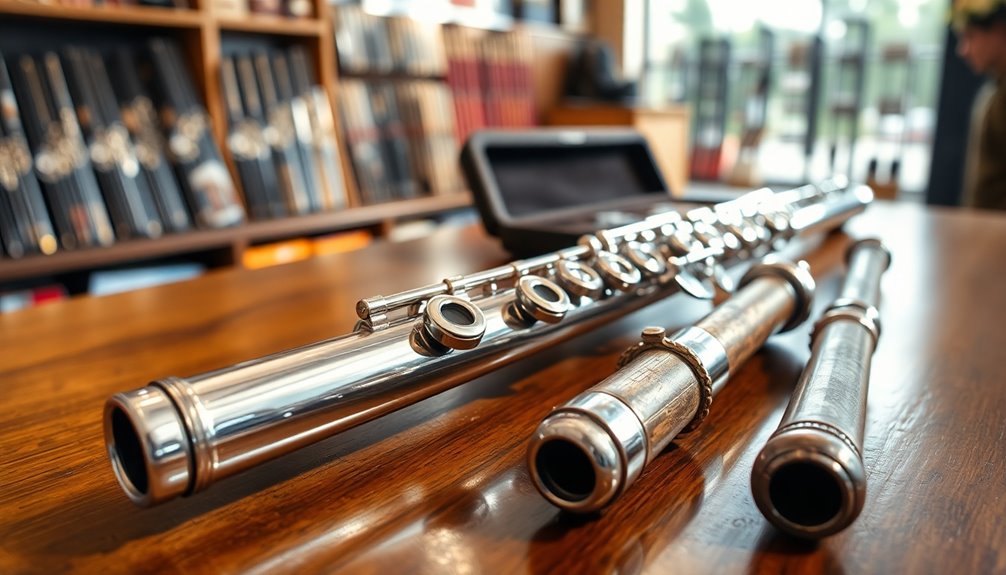
After establishing your budget, you'll need to decide whether to buy a new or used flute. Each option has its own set of advantages and considerations, so let's break them down.
New flute advantages include:
- Warranty Protection: New flutes typically come with warranties that cover repairs and defects, giving you peace of mind.
- Modern Features: They often include the latest design and materials, which can enhance your playing experience.
- Fresh Start: A new instrument allows you to be the first owner, ensuring it's in pristine condition.
- Easier Resale: If you choose to upgrade in the future, a new flute may hold better resale value.
On the other hand, used flute benefits might appeal to you as well:
- Cost Savings: Used flutes can be considerably less expensive, allowing you to invest in accessories or lessons.
- Character: Many used flutes have a unique history, adding a special story to your musical journey.
- Quality Instruments: You may find high-quality brands at a lower price, which can be a great deal.
- Availability: There's often a wider selection of makes and models in the used market, giving you more options to explore.
Additionally, purchasing a quality instrument can significantly promote faster progress in your playing skills.
Ultimately, your choice should reflect your personal needs and goals as a flutist.
Whether you opt for new or used, both paths can lead you to fulfilling your musical aspirations.
Recommendations for Beginners
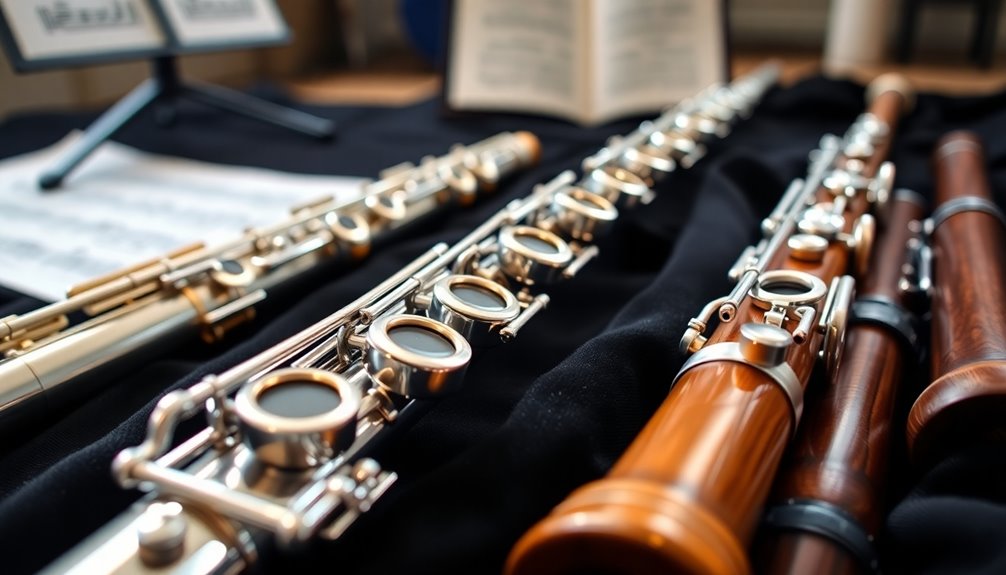
Choosing the right flute as a beginner can feel overwhelming, but focusing on a few key recommendations can simplify your decision. First, you'll want to contemplate beginner models specifically designed for those just starting out. These flutes typically offer a more affordable price point, while still providing quality sound and playability.
Look for brands that are well-regarded in the flute community, as they often have a reputation for producing reliable student flutes.
When selecting a flute, think about the material. Most beginner models are made of nickel silver with a silver plating, which strikes a good balance between durability and sound quality.
You might also want to reflect on whether you prefer an open or closed hole design. Closed hole student flutes are generally easier for beginners to manage, allowing you to focus on developing your technique without getting overwhelmed.
Don't forget to check the flute's key mechanism. A reliable mechanism guarantees that your flute stays in tune and plays smoothly.
If you have the chance, try out different flutes at a music store. You'll get a feel for what works best for you. Additionally, consider factors such as key systems when deciding on the best flute for your skill level.
Finally, remember to consult with your music teacher or instructor if you have one. They can provide valuable insights tailored to your specific needs and aspirations.
Maintenance and Care Tips
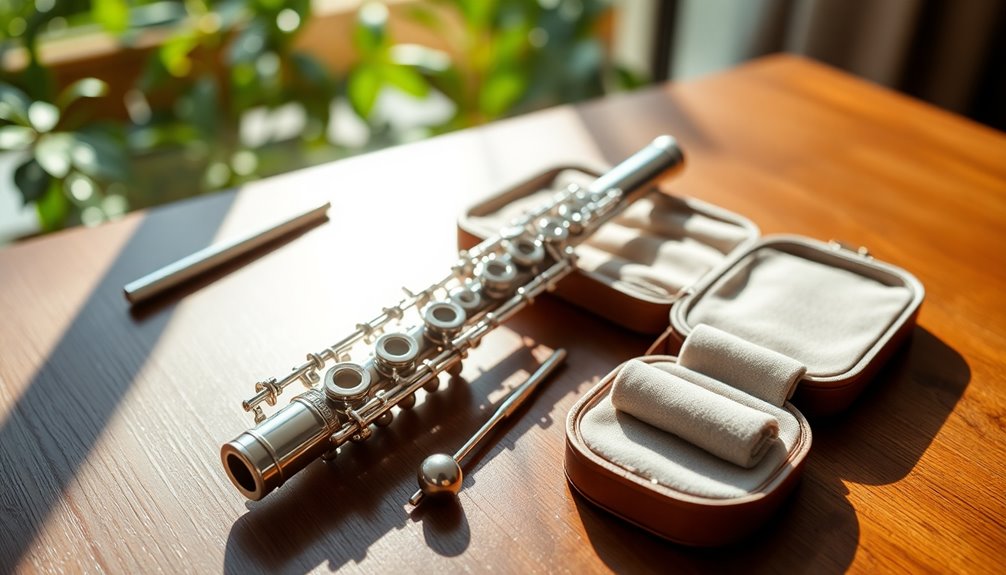
Proper maintenance and care are essential for keeping your flute in top shape and ensuring it sounds its best. As a beginner, it might seem intimidating, but with some simple cleaning techniques and proper storage habits, you'll keep your instrument looking and sounding great.
Here are some straightforward tips to help you maintain your flute:
- Daily Cleaning: After each practice session, use a cleaning rod with a soft cloth to remove moisture from the inside of the flute. This prevents buildup and keeps your flute in good condition.
- Avoid Excessive Moisture: Store your flute in a case when not in use. Make sure it's completely dry before putting it away. Excess moisture can lead to corrosion and damage.
- Regular Inspection: Check for any signs of wear, such as loose pads or sticky keys. If you notice any issues, consult a professional for repairs.
- Keep it Away from Extreme Temperatures: Avoid leaving your flute in hot or cold environments, like your car. Extreme temperatures can warp the materials and affect performance. Additionally, incorporating best practices into your care routines will help ensure the longevity of your instrument.
Frequently Asked Questions
What Is the Best Age to Start Learning the Flute?
The best age to start learning the flute really depends on the individual.
Generally, kids around 8 or 9 can benefit from the physical coordination and focus required. However, if you're older, don't worry!
Flute benefits everyone, regardless of age. You'll improve your breathing, boost your confidence, and find a sense of belonging in music.
Ultimately, the right time is when you're ready and excited to explore this beautiful instrument!
Can I Play the Flute if I Have Small Hands?
Absolutely, you can play the flute even with small hands! Many flutes feature an ergonomic design tailored for comfort, making it easier for you to reach the keys.
Look for a small flute or one specifically designed for players with smaller hands. These options guarantee you feel confident as you learn.
How Long Does It Take to Learn the Flute?
Learning the flute can take anywhere from a few months to a couple of years, depending on your practice duration and learning pace.
If you commit to regular practice, you'll likely see progress faster. Everyone's journey is unique, so don't compare yourself to others.
Celebrate small victories, and remember that consistency is key. Engaging with fellow flutists can also enhance your experience, making learning more enjoyable and helping you feel connected.
What Are Common Mistakes Beginners Make When Learning?
Learning the flute can feel like building a sandcastle; if you don't lay a strong foundation, it'll crumble.
Many beginners struggle with embouchure issues, affecting their sound quality. Additionally, poor practice habits can hinder progress, leading to frustration.
It's crucial to focus on developing a consistent routine and refining your embouchure from the start.
Should I Take Lessons or Learn by Myself?
When deciding whether to take lessons or learn on your own, consider your learning style.
Private lessons offer personalized feedback and structure, which can accelerate your progress. However, online resources provide flexibility and a wealth of information.
If you thrive in a social setting, lessons might be best, but if you prefer self-paced learning, online tutorials can work wonders.
Ultimately, finding a balance between both could enhance your journey and keep you motivated.
Conclusion
To sum up, choosing your first flute is an exciting journey that sets the stage for your musical growth. Did you know that nearly 75% of beginner flutists prefer open-hole flutes for their expressive capabilities? As you consider your options, prioritize comfort, sound quality, and your budget. Whether you opt for a new or used instrument, remember that regular maintenance is key. Embrace the process, and soon you'll be creating beautiful music with your very own flute!






